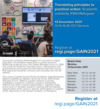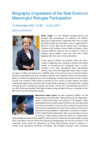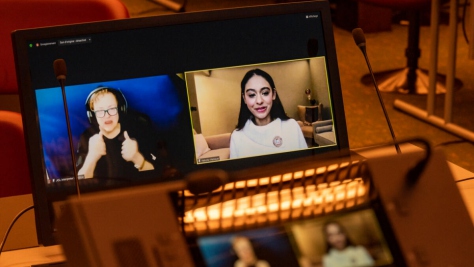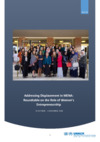Ethiopia: Somali refugees to be relocated away from border
This is a summary of what was said by UNHCR spokesperson Jennifer Pagonis – to whom quoted text may be attributed – at today's press briefing at the Palais des Nations in Geneva.
In Ethiopia today (Friday), UNHCR teams are expected to start relocating a group of 500 newly-recognized Somali refugees who fled from renewed conflict in strife-torn south and central Somalia over the last year. They have been staying around the Kebribeyah area, near the Somali border in eastern Ethiopia and are being relocated to a re-opened UNHCR camp at Teferi Ber.
The refugees are part of a group of 4,000 Somali refugees who have recently been granted refugee status by UNHCR and the government's Authority for Refugees and Returnees Affairs (ARRA). An estimated 7,000 additional Somalis who also claim to have fled fighting and insecurity in Somalia, are waiting to be screened at other sites in eastern Ethiopia.
The new camp site at Teferi Ber, some 120 km north of Kebribeyah, was formerly a UNHCR camp which in the 1990s hosted some 49,000 mainly Somalis refugees who had fled fighting in their country. The camp was officially closed in 2001 after all the refugees returned, mainly to the self -declared republic of Somaliland.
After arriving at Teferi Ber, the refugees will spend three days in a reception centre where they will be allocated plots of land to construct homes and given building materials. They will also be given food as well as tarpaulins, blankets, sleeping mats, kitchen sets, jerry cans, kerosene stoves, and soap. The ARRA has established a temporary health centre until permanent structures can be built.
The Somali Region of Ethiopia already hosts more than 16,500 refugees. With the new arrivals, the total is 20,300. At the peak of the Somali refugee crisis in the early 90s, the region hosted 628,000 refugees in eight camps. The overwhelming majority went home between 1997 and 2005, and all of the camps were closed except a camp at Kebribeyah.
Related news and stories
Thousands of newly arrived Somali refugees in Ethiopia relocated to new settlement
Samira's Story
Drought brings life-threatening food shortages for refugees in Ethiopia
100,000 new Somali refugees arrive in Ethiopia in the past month, UN and partners are calling for urgent funding
UNHCR teams and partners rush assistance to some 100,000 newly arrived Somali refugees in hard-to-reach area of Ethiopia
As the Horn of Africa drought enters a sixth failed rainy season, UNHCR calls for urgent assistance
-

HLOM side event translating principles to practical action
8 Dec 2021 Event-Flyer: Reflecting progress since the Global Refugee Forum in 2019, this event will examine innovative tools, contributions from governments and academics themselves that help ensure that displaced students, scholars and scientists are not left behind. -

UNHCR outraged as three staff members wounded in attack in eastern Democratic Republic of the Congo
8 Dec 2021 -

HLOM side event meaningful refugee participation list of speakers
8 Dec 2021 Biography of speakers of the Side Event on Meaningful Refugee Participation (HLOM, 13 December 2021) -

Darfur clashes displace thousands
7 Dec 2021 -

Event days
-

Governments pledge over US$1 billion to support UN Refugee Agency's work for 2022
7 Dec 2021 -

Drumming against gender-based violence in Ecuador
7 Dec 2021 Afro-Ecuadorians and Afro-Colombian refugees use traditional arrullo rhythms and song to open a conversation about gender-based violence. -

Compendium - Protection-sensitive access to clean cooking (2021)
7 Dec 2021 This compendium is intended for UNHCR personnel and partners to support programme development in compliance with UNHCR policies and guidance. It outlines a step-by-step approach and a list of options to address cooking challenges when confronted with limited, inappropriate, inefficient local cooking solutions, or the lack of access thereof. -

Addressing Displacement in MENA: Roundtable on the Role of Women's Entrepreneurship
7 Dec 2021 The roundtable was a unique opportunity to provide a platform for women entrepreneurs to frame their role in issues related to displacement in the MENA region and identify innovative livelihood strategies and opportunities for refugee women through women's empowerment and economic participation. It was attended by 40 business women from across MENA and refugees from 5 nationalities and urban community centre.
